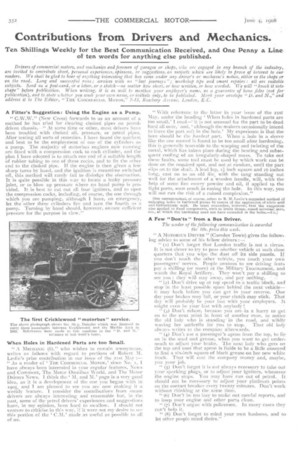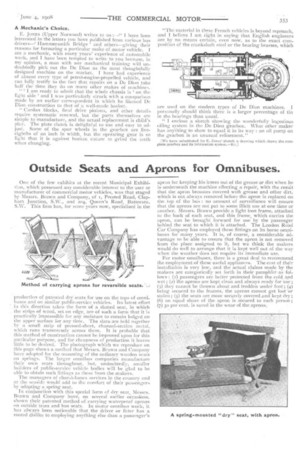Contributions from Drivers and Mechanics.
Page 22

Page 23

If you've noticed an error in this article please click here to report it so we can fix it.
Ten Shillings Weekly for the Best Communication Received, and One Penny a Line of ten words for anything else published.
Drivers of commercial looters, and mechanics and foremen of garages or shops,g)ho are engaged in any branchof the industry, are invited to contribute short, personal experiences, opinions, or suggestions, on subjects which ore likely to Prove of interest to our readers. We shall be glad to hear of anything interesting that has come under any driver's or mechanic's notice, either 111 the shops Or On the road. Long and successful virus.; services with lie " lost journeys" ; workshop tips and smart repairs : all are suitable. subjects. Send Os a post•card, or a. letter, or a sketch—no matter how short, or how written, or how worded. life will " knock it into. shape" before publication. When writing, it is as well to mention your employer's name, as a guarantee of bona fides (not for ublication), and to state whether you wish your own name, or initials only, to be published. Mark your envelope "D. and M.," and address it to The Editor, " THE COMMERCIAL MOTOR," 7-75, Rosebery Avenue, London, E.G.
A Fitter's Suggestion: Using the Engine as a Pump.
" C.W.W." (New Cross) forwards to us an account of a method he has tried for clearing choked pipes on -petroldriven chassis,---" At some time OE other, most drivers have been troubled with choked oil, pressure, or petrol pipes. After testing all sorts of remedies, I have found the quickest and best to be the employment of one of the cylinders as a .pump. The majority of motorbus engines now running are fitted with a compression cock to each cylinder, and the plan I have adopted is to attach one end of a suitable length of rubber tubing to one of these cocks, and to fix the other end to the choked pipe. If the engine is then given a few sharp turns by hand, and the ignition is in switched off, this method will rarely fail to dislodge the obstruction. It is quite possible in this way to locate a leaky pressure joint, or to blow up pressure where no hand pump is provided. It is best to cut out all four igniters, and to open the compression cocks, including, of course, the one through which you are pumping, although I have, on emergency, let the other three cylinders fire and turn the fourth as n pump. Turning by hand should, however, ensure sufficient pressure for the purpose in view."
When Holes in Hardened Parts are too Small.
" A MECHANIC (6)," who wishes to remain anonymous, writes as follows with regard to. portions of Robert M. Leslie's prize contribution in our issue of the zist _May :— " As a reader of THE COMMERCLII, MOTOR,' since No. I, I have always been interested in your regular features, News and Comment, The Motor Omnibus World, and The Motor Drivers News. I think the M. and M,' page is a very good idea, as it is a development of the one you began with in 1905, and I am pleased to see ycu are now making it a weekly feature. I consider the contributions from steam drivers are always interesting and reasonable but, in the past, some of the petrol drivers' experiences and suggestions have, in my opinion, been hard to swallow. I should not venture to criticise in this way, if it were not my desire to see this portion of the CM,' made as useful as possible to all of .us. " With reference to the letter in your issue of the 21st May, under the heading When holes in hardened parts are too small,' I read—' it is not unusual for the part to be dead_ hard all over, and, although the makers occasionally intend to leave the part so-ft in the hole.' My experience is that thebore should be the hardest part. When a hole in a sleeve like the one named is found to be too small after hardening., this is generally traceable to the warping and twisting of the metal, which has taken place during the heating-and subsequent cooling of an irregularly-shaped mass. To take out these faults, some 'foci must be used by which work can be done on the required spot, and not at random, until the Part slips on to the shaft. A lead lap, 1,1 inch square and r6 inches lung, cast on to an old file, with the tang standing out well for the attachment of a wooden handle, will, with the help of some fine emery powder and oil, if applied to the tight parts, soon result in easing the hole. In this way,. you will not run the risk of a ruined complexion."
L'Our correspondent, of course, refers to R. M. Leslie's suggested method a enlarging holes in hardened pieces by means of the application of nitric ;lea and hydrochloric acid. He must reineinher, however, that the suggestion also applied to fixed components, such as brake drums, coned universe jaws, etc., in which the hatdening need not have extended to the holes.—En."
A Few "Don'ts" from a Bus Driver.
The sender of the following communication is awarded the 70s. prize this week.
" A MOTORBUS DRIVER "(Camden Towin) gives the follow
ing advice to some of his fellow drivers .
" (i) Don't forget that London traffic is not a circus. It is nOt.clever to try to pass another vehicle at such close quarters that you wipe the dust off • it Side panels. If you don't touch the other vehicle, you touch your own passeivrers' nerves. People anxious to see driving feats pay a shilling (or more) at the Military Tournament, anti watch the Royal Artillery. They won't pay a shilling to see you : they will stay away, and pay nothing. •
"-(2) Don't drive up at top speed to a traffic block, and stop in the least possible space behind the next vehicle— it may back before you can get in your reverse. One day your brakes may fail, or your clutch may stick. That day will probably be your last with your employers. It might even be your last with anybody " (3) Don't refuse, because you are in a hurry to get on to the next point in front of another man, to notice the old lady who is standingin the road, and wildly waving her umbrella for you to -stop.• That old lady always writes to the company afterwards.
" (4) Don't use a passenger's apron from the top, to lie on in the mucl and grease, when you want to get underneath to adjust your brake. The next lady who gets on the top and uses that apron is liable to be a little annoyed to find a six-inch square of black grease on her new white frock. That will cost the company money and, maybe, you your job.
" () Don't forget it is not always necessary to take out your sparking plugs-, or to adjust your igniters, whenever the engine stops. You may have run out of petrol. 1-11 should not be necessary to adjust your platinum points on the contact breaker every twenty minutes. Don't work without thinking at the same time.
"-IP) Don't be too lazy to make out careful reports, and to keep your engine and other parts clean. " (7) Don't argue with policemen. In many cases they can't help it.
" (8) Don't forget to mind your own business, .and to. let other people mind theirs."
A Mechanic's Choice, E. JONES (Upper Norwood) writes to us --" I have been interested in the letters you have published from various bus drivers= Hammersmith Bridge ' and others—giving their reasons for favouring a particular make of motor vehicle, I am a mechanic, with many years experience of automobile work, and I have been tempted to write to you because, in my opinion, a man with any mechanical training will undoubtedly pick out the De Dion as the most thoughtfully designed machine on the market. I have had experience of almost every type of petrol-engine-propelled vehicle, and can fully testify to the fact that repairs on a De Dion take half the time they do on many other makes of machines,
" I am ready to admit that the whole chassis is on the light side ' and I was particularly struck with a comparison made by an earlier correspondent in which he likened De Dion construction to that of a well-made basket.
" Cardan blocks, .final drive pinions:, and other details require systematic renewal, but the parts themselves are simple to manufacture, and the actual replacement is child's play. The plate clutch is delightful to use and easy to adjust. Some of the spur wheels in the gearbox are fiveeighths of an inch in width, but the operating gear is so light that it 18 against human. nature to grind the teeth when changing. "The material in these French vehicles is beyond reproach, and I believe I am right in saying that English engineers are by no means certain, even now, as to the exact composition of the crankshaft steel or the bearing brasses, which
are used on the modern types of De Dion machines. I personally should think there is a larger percentage of tin in the bearings than usual.
" I enclose a sketch showing the wonderfully ingenious oiling system in the De Dion gearbox. What other maker has anything to show to equal it in its Ivay : an oil pump on the gearbox is an unusual refinement."
[We have substituted for F., Jones' sketch a thawing which shows the complete gearbox and its lubrication system.—E.D.]
























